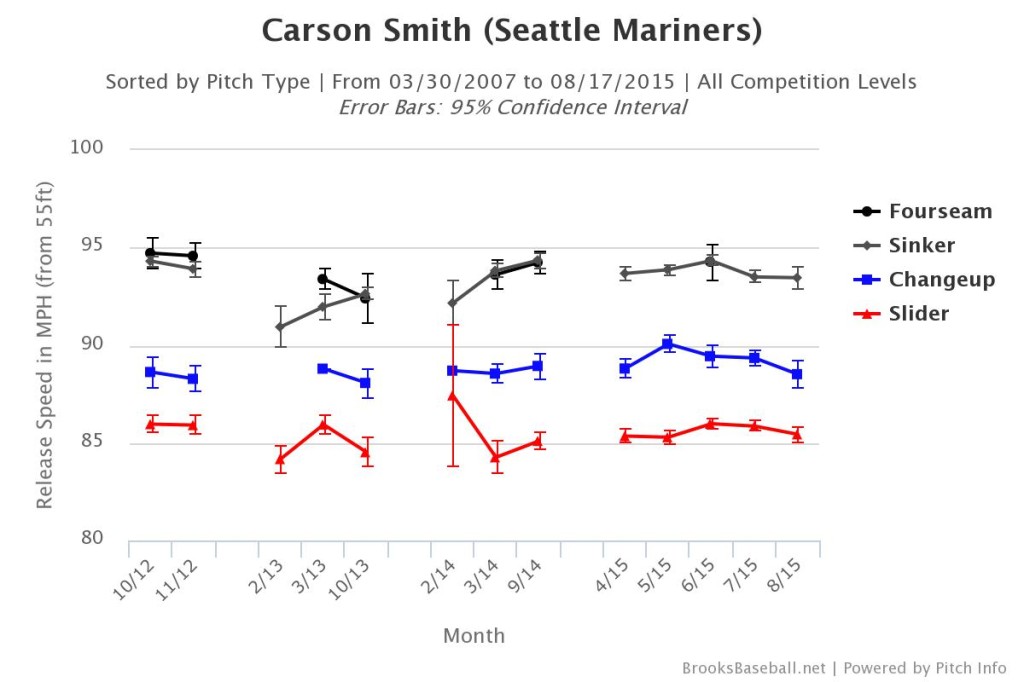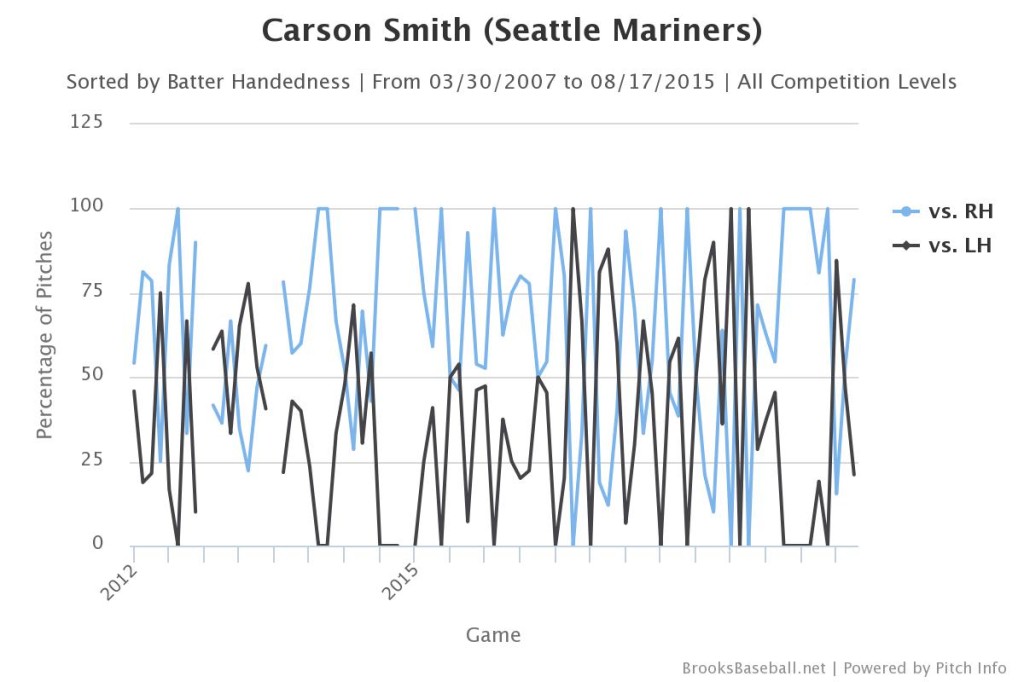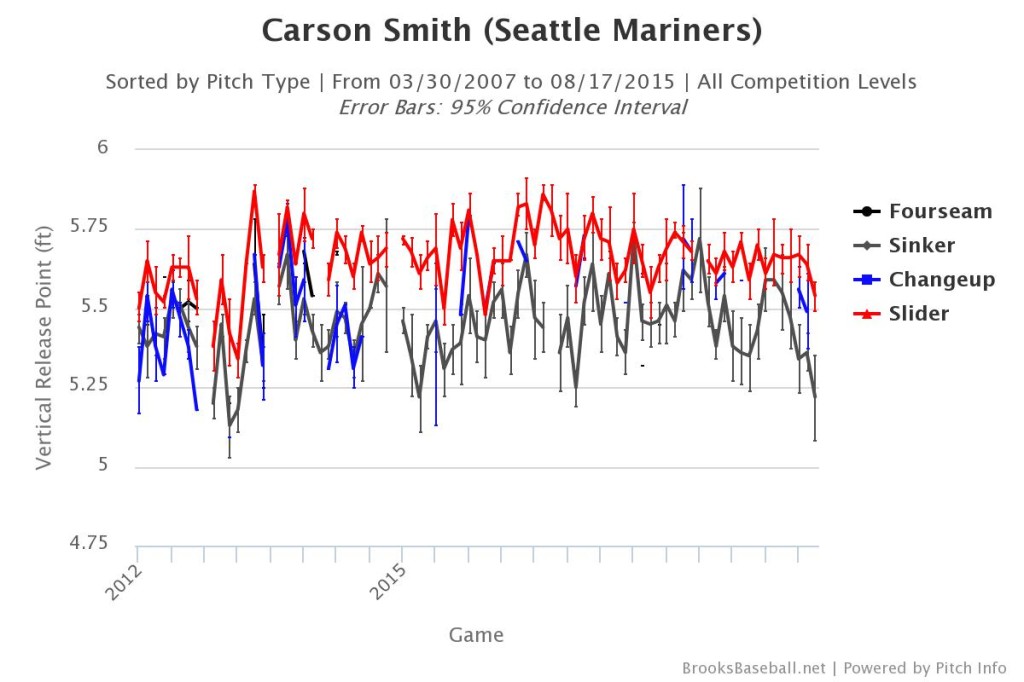What’s Wrong with Carson Smith?
Carson Smith suffered another blown save yesterday, his 3rd of the year. As of mid-July, Smith was a nearly unhittable force of nature. His swerving, tumbling sinker and big slider combined to make life exceedingly difficult on lefties as well as righties, and, crucially, he had enough control that he wouldn’t give up many free passes. From the beginning of the year through July 12th, Smith allowed a triple slash line of . 169/.223/.262. His K:BB ratio was 47:6 in 36 1/3 IP, and while he had 3 HBPs, that’s still over 5 punchouts for every free baserunner. Because of the sink on all of his pitches, he was a ground-ball machine which made it next to impossible for batters to drive pitches in the air.
Since that date, however, his slash line is .265/.419/.347. His BABIP in that stretch is a mind-boggling .433, and worse, his K:BB ratio is just 19:11. Obviously, we’re talking about a relief pitcher and we’re divvying up his season into little chunks; sample-size is a pretty big concern here. It’s possible, maybe likely, that a bit of regression in control coupled with a BABIP fluke explains essentially all of Smith’s struggles. But that’s true of just about anything, especially within-season. I know a lot of fans and others have been asking the same question as Sky Kalkman did on twitter yesterday:
So, what's up with Carson Smith?
— Sky Kalkman (@Sky_Kalkman) August 16, 2015
. Let’s take it as a given that regression and luck play a role, and then forge ahead to see if we can find other potential culprits.
At this point in the season, and with someone without a ton of big league experience, it’s probably a good idea to start with velocity. Some fans perceive a drop, and his overall yearly fastball average velo isn’t what it was in 2014. Unfortunately (uh, make that *fortunately*), I don’t see any evidence of a big drop here. His month-by-month averages for 2015 are quite stable. He had some extra oomph in June, but his stats in July/August aren’t appreciably different from his stats in May…when he was untouchable:
I’ll say that it is mildly surprising that Smith’s recent velo is “only” the same as it was in May. Typically, pitchers gain velocity as the weather heats up – April and May averages are below their own yearly average, which July/August are above. The fact that Smith’s line moved up in June but then back down in July is interesting, but again, we don’t see any evidence that he’s suddenly lost 1-2mph on his pitches.
Another guess was that he’s been facing a lot more left-handed hitters. While he’s been excellent against them overall, he’s still got large platoon splits – it just hasn’t mattered because righties have had no chance, so anything lefties do looks decent by comparison. Again, though, I don’t think that’s what’s happened. There’s quite obviously a ton of noise here – we’re looking at the percentage of pitches thrown to lefties and righties by game. If anything, he’s seen a few more righties recently, but if you think the entire chart is noise, I wouldn’t argue. What we DON’T see is some clear, distinct change in batters-faced that would account for the performance drop.
So what IS going on here? I’ve got three observations that may play a part in this, particularly in combination. On their own, they all seem a bit too subtle, but remember that the luck component of Smith’s struggles is probably pretty big, especially given the starring role BABIP has played. First: Smith is throwing a few more balls in recent games. From July on, he’s thrown balls on 37% of his sinkers and a bit over 40% of his sliders. From April through June, those figures were 35% and 26%, respectively. His slider’s fallen markedly, and it’s not just that batters are suddenly taking it whereas they were chasing them in the early going: batters typically swing much less often against Smith than the league average. When he was great, batters swung at around 41% of his pitches. Now, it’s 40% or so. This suggests that the increasing ball rate is a product of pitch location and not a batter’s willingness to chase.
Second, he’s using his slider much more often. Through the end of June, Smith threw 56% sinkers and 38% sliders, including 43% sliders to right-handed bats. Since then, he’s thrown a bit under 41% sinkers and a whopping 51% sliders. To righties, he’s at nearly 2/3 sliders to 1/3 sinkers. He’s throwing a whole lot more of the pitch he’s struggling to command, and that may be making him more predictable. To righties, he’ll only throw a fastball when he’s behind. Lefties can count on fastballs very early, and they can count on sliders if Smith’s ahead. Given the fact that he’s throwing the slider for a ball more often, it’s likely he’s pitching from behind a bit more.
Third, he’s shown a tendency for separation between the release points of his sinker and slider. That is, from time to time, Smith will release his sinker 4-6″ below where he releases his slider. At other times, the two points are nearly identical. Recently, the two have diverged a bit, as you can see here:
Now, as you can *also* see, they were pretty far apart at the beginning of 2015; it’s not like this has never happened before. Still, there are probably things you can get away with as a relative unknown that are harder to get away with as an MLB closer. Pro scouting presumably pays a lot of attention to things like this, as we discussed earlier regarding Tai Walker. If one team spots a subtle tell, word may get around. And all of these things could be interrelated: if batters have a good idea a slider is coming, they may be more likely to take it (they haven’t fared any better when they DO swing at sliders), and if his slider location is off a bit, that means more hitter’s counts. As a guy who depends on getting batters to take or swing through pitches *in the strikezone*, if batters have a decent idea what’s coming – whether because they can recognize the release point or they’re counting on a 2-0 sinker – Smith’s job becomes doubly difficult.
I think it may be worthwhile for Smith to move back to a pitch mix that features more sinkers, even if that’s the pitch that’s getting hit the hardest recently. Instead of looking for out-of-zone swings and punchouts, I think it might be good to focus on ground balls for a while, and see how his slider responds to being a putaway pitch as opposed to his primary offering. So if you’ve seen him throughout the year, what have you noticed? Is there a Fernando Rodney-style tell? Velo drops *within* outings, as he’s now seeing a few more 2IP appearances? Something else?
Comments
4 Responses to “What’s Wrong with Carson Smith?”
Leave a Reply
You must be logged in to post a comment.



I sometimes wonder if, when this sort of thing happens, it’s the org at fault – as in they can’t leave well enough alone and decide they know how to “improve” things. But maybe that’s the dejected Mariners fan in me speaking out of turn.
One benefit to such speculation on my part is it’s hard to disprove. 😀
At the risk of sounding like an ass, I’m pretty sure he needs glasses.
I’m not gonna say it’ll have a Ricky ‘Wild Thing’ Vaughn effect on his performance. But I’m pretty sure Carson is shortsighted because he’s squinty mcgee out there on the mound.
Other than that, it could be some bad luck. For instance, the game tying hit yesterday was on a pitch that was nasty as hell.
I have no idea if the org changed something in Smith that might account for this variability. I’m guessing not, but that’s just a guess. What I will say is that the org often seems to struggle with *stopping* slides like this.
It is obvious that he is tired and in desperate need of some coaching. Not to change him but develop Carson mentally and yes to some extent physically. There is a big difference between AAA and the show. You can’s stop learning and making adjustments both mentally and physically. And the problem is at EVERY level. Until a change is made to bring in baseball people who know how to develop players, we will see seasons like this one.